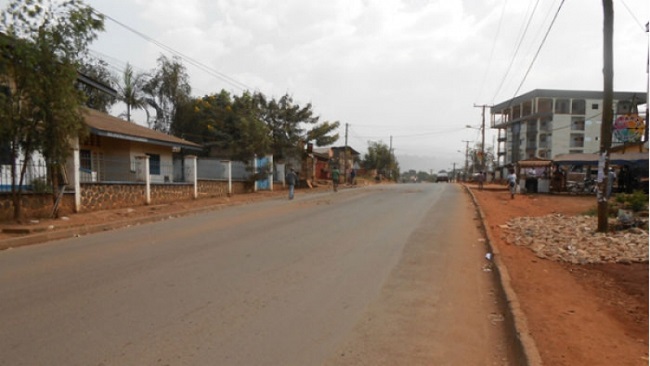From Ghost town to Ghost town: The essence of a new Anglophone nationalism
Since 2016 Southern Cameroons has been experiencing a wave of anti-government protests unleashed by hatred for the Biya Francophone Beti Ewondo regime. Anglophone Cameroonians say Francophones have taken over their country and were systematically destroying their Anglo-Saxon heritage. Many people have been killed in Kumba, Bamenda, Buea and Kumbo.
Anti-government demonstrations rocked the Universities of Buea and Bamenda. It was followed by an industrial action staged by Common Law Lawyers and the Anglophone Teachers Trade Unions. Thousands of demonstrators went on to the streets calling on the Yaounde regime to embrace political reform and to stop killing protesters. Southern Cameroonians also demanded the release of all those arrested and respect for justice and the rule of law. However, the response from the Francophone dominated security forces, which used live ammunition against protesters, led to the death of many unarmed people.
Although the government security apparatus reported that the demonstrations had been contained and the 83 year Head of State described the protesters as “extremist and manipulators”, the current political situation in British Southern Cameroons has become volatile. Our intelligence officers have all reported that things are fast changing and developments have become increasingly unpredictable. The leaders of the various trade unions have metamorphosed into a consortium and are said to be busy devising alternative methods of protest that range from weakening the Francophone government institutions through staying at home and not operating businesses to organizing a Diaspora-based grand solidarity rally. The ghost town being observe today in Southern Cameroons has so far been a huge success.
Some conclusions could be drawn following the failure on the part of the Francophone government to halt the ghost town operation. Firstly, these new generations of Anglophones have lost faith in the ONE Cameroun concept. Secondly, the so-called Anglophone political elites militating with the ruling CPDM party no longer have legitimate authority in Southern Cameroons. And thirdly, Cameroon as a nation has entered its last journey of many dangers.
In Mamfe, a town that hosted the 1953 Conference after the Eastern Regional Crisis at Enugu which eventually paved the way for reunification, Southern Cameroonians refused to sing the national anthem. To be sure, Manyu Division has shut down completely today Monday the 9th of January in support of the Anglophone nationalism. In Mundemba, even the lame and the blind joined in anti La Republique protest. In Kumba, Buea, Bamenda and Kumbo where the first demonstrations took place, residents have resorted to a new mode of protest – staying at home. The streets of all major towns and cities in Southern Cameroons are now deserted and workers are staying at home and business remained closed.
We of the Cameroon Concord News Group understand that Southern Cameroonians have opted for this type of protest because their leaders demanded an answer from the Francophone government, but the response was one of bullets in return. This peaceful ghost town method of protest demonstrates a complete rejection of the Biya Francophone Beti Ewondo regime by Southern Cameroonians. The ghost town protest is an indication of the increasing maturity of the leaders of the Consortium.
The Yaounde regime is planning to blocked internet connection and access to social media tools. But some experts have argued that this may attract the use of proxy servers. Cameroun’s Minister of Communications and government spokesman has repeatedly claimed that that social media had been used to churn out false information, mostly seditious remarks, trying to agitate people against security forces. There are growing numbers of Anglophone news websites all supporting the creation of a Southern Cameroons state.
Cameroon government receives billions of dollars annually from international donors and has remained a key strategic partner of the West, particularly the US and the French, in the ‘war against Boko Haram terror. This financial support has been toughening the regime’s resolve to silence Anglophone dissenting voices. The French and the US approach of tiptoeing around human right violations in Cameroun and its continued support for the Biya regime has been stirring up anger among even Francophone sections of the country. The US, the EU including the Roman Catholic Church are supporting a regime – which they know is clearly undemocratic and is the very cause of the state terrorism we now observe in Southern Cameroons.
Ever since the police atrocities in Bamenda, Buea Kumba and Kumbo, no pressure has been put on the regime to allow for credible investigation into the rapes and killings. Not a single UN official has demanded access to visit the affected areas to establish what really happened in Southern Cameroons. Minister Issa Tchiroma is always ready to inform international public opinion that the government has its own system of checks and balances and that Cameroun’s own Human Rights Commission was doing its job in investigating and publicizing the human rights situation in the country.
The regime supported by Anglophones such as Ghogomu Paul Minglo is still in denial of the injustice its policies have resulted in. With the success of today’s ghost town, President Biya now has the opportunity to change La Republique’s approach – otherwise if the situation is left to fester, there will be more outbursts, more unrest, more protests and perhaps more violence.



By Soter Tarh Agbaw-Ebai
Editor-in-Chief
Cameroon Concord News Group




